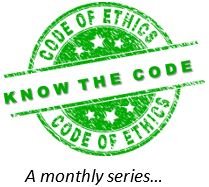Know the Code: Having Boundaries
/By the Office of Ethics, Compliance and Labor Standards:
Too close for comfort. That phrase may come to you as you stand in a crowded elevator. Or when someone stands too close to you in line at the grocery store.
You can take the next elevator or move several steps away from the other shopper. At work, it’s not always that simple.
We all have boundaries, but they may differ. What is too close for you, may not seem that way at all to other people or those from different cultures.
Touching is another boundary. Friendly pats, back rubs, hugs. Kisses on each cheek. The last one is a very common greeting in some countries or cultures.
Those gestures may not bother some people. But they make others feel nervous, anxious or uncomfortable.
Some people do not like to be touched. If someone says they’re not a hugger, they usually mean it.
If you’re a so-called touchy, feely person, keep in mind, there are times you need to respect other peoples’ boundaries.
At work, touching and invading others’ space could be seen as harassment.
If you’re the worker who feels uncomfortable, you can set boundaries. Politely explain, it’s not personal. You need more space or don’t like being touched.
It ensures a healthy and professional work environment.
Some children learn about boundaries at an early age. There’s even a song. The lyrics say: "Please stop. I don't like that. I'm feeling uncomfortable. I need more space. Not around me. Don't take it personally. It's just a boundary."
Establishing boundaries is a skill for kids and adults alike. Here at the County, learning this skill aligns with our values and Code of Ethics.
The County also has a Nondiscrimination/Anti-Harassment policy. If someone is not respecting your boundaries and talking to the other person hasn’t helped, you have options.
Talk with your immediate supervisor, your departmental human resources officer or contact the Office of Ethics and Compliance (OEC) by:
Calling the Ethics Hotline at 866-549-0004
Visiting the OEC website
Emailing a written complaint to OEC@sdcounty.ca.gov.
